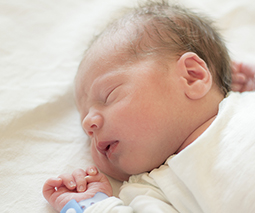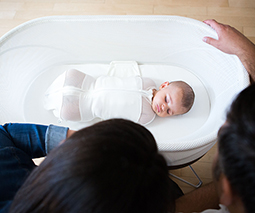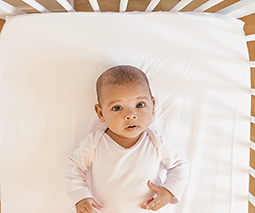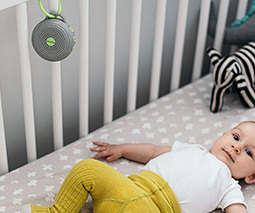Experts reveal their best sleep tips for babies and toddlers

Whoever came up with the phrase ‘sleeping like a baby’ clearly didn’t have a baby in the house. Or a toddler. Or a small child. That end-of-a-long-day slumber struggle is one that’s played out in households across Australia – and the world – every night.
Babyology asked some leading sleep consultants, as well as ‘baby whisperer’ Tizzie Hall and parenting guru Pinky McKay, to give us their best sleep tips for babies and toddlers.
Bookmark this article, and share it with your sleep-deprived friends – the information it contains is parenting gold.
Jo Ryan – BabyBliss
Jo Ryan, author and director of one of Australia’s most respected parenting support services, BabyBliss, uses a gentle technique to settle babies and toddlers. This is what she has to say.
Babies
- Establish a routine. The most important thing I can recommend is to establish a routine with your baby. It’s never too early to establish a night time routine which involves a story, a bath and a feed. You might want to incorporate your own rituals to share with your baby – maybe it’s a massage. Maybe it’s your favourite childhood book (even if baby doesn’t understand it yet). It’s all part of the predictable rhythm to winding down.
- Set a bedtime. Related to routine is timing. It’s important to have a set bedtime. I know these days we all live a fairly unstructured life. We value spontaneity but when it comes to babies, structure and predictability can really make a difference. When a baby feels like they know what is coming next, they feel more in control and this feeling helps them to relax. You don’t have to make bedtime really rigid (7.08pm is not that different from 6.49pm) but roughly between 6pm and 7pm you should start a wind down process and stick to it. I have heard some mothers settling their baby as late as 11pm and then finding that the baby does not sleep well and is unsettled during the day. The best hours for baby to sleep are the early hours of the night as this is when they have their deepest and most refreshing sleep.
- Listen to your baby. I do not advocate controlled crying, but I do think you need to listen to your baby carefully to see if they are crying or just making a few noises which are their winding down noises. When you have a new baby, it feels awful to leave them and you don’t want them to be distressed but many (if not all babies) do make a few noises as they’re going to sleep on their own. Prior to 12 weeks, it’s unlikely they can settle on their own; they need your help, but do try to leave the room first and give them a moment to try. Once they get past 12 weeks, and self-settling starts to become a possibility, if you rush in, they will never get the chance to learn this skill. Listen to your baby and trust your intuition. If you feel like they are getting distressed, don’t leave them, but if you feel like they are winding down, give them a moment.
- Check the baby’s room. Babies’ rooms can be incredibly distracting. Mobiles over the bed, the flashing light of the modem on the desk, cracks through the blinds. All these things can be fascinating to a baby. Making the area around the cot dark and boring can really help.
- Trust your instincts. You are ok and your baby’s ok – unless you feel something is wrong. If you do, don’t wait outside the nursery door. It’s fine to check your baby if you’re worried. It’s fine to comfort your baby if they’re distressed. I really believe that parents know what’s best for their baby.
Toddlers
- Maintain a bedtime routine. Keep a routine going and stick to it, even if your toddler pushes back. Children need ritual and if you stick with it, they will understand that that is the way they go to bed every night.
- Don’t allow stalling. By having a great bedtime ritual, one that clearly goes through every step you take before sleep (clean teeth, do a wee, have one book, have a drink of water), then when your toddler tries to stall by asking for extra things, you can just reinforce the ritual and point out that this step has already happened or it isn’t in the bedtime ritual.
- 7pm is a great bedtime. Toddlers get very tired! They need to get lots of that great deep sleep that happens before midnight. If a toddler goes to bed too late they often don’t sleep well, wake early and then can be difficult the next day because they are exhausted. Establish a 7pm bedtime and everyone will feel more rested.
- Try not to sit with your toddler until they’re asleep. Toddlers can start to want someone staying with them until they are asleep. This can start innocently enough but 10 minutes can extend to an hour or more in a short space of time. If your toddler is distressed then, of course, stay until they are calm, but then tell them you are leaving to do something, but that you will be back in a few minutes. Make sure you always go back to see them if you say you will, and keep doing this until they are asleep.
- Try to keep calm amongst the chaos! Toddlers will take their cues from you. So try to remain calm (which can be very hard at this time of day). If you lose it, then your toddler will lose it and bedtime will become more and more difficult.

Tizzie Hall – Save Our Sleep
Known internationally as the baby whisperer, Tizzie Hall explains that her advice isn’t medical or scientific, but tried and tested and based on her many years of experience with babies and young children. She advocates using what suits your family’s lifestyle and beliefs.
- Follow a routine from as early as possible, babies and toddlers feel safe and secure if they know what and when things are going to happen.
- Always feed your baby or toddler until he or she is full, never restrict the amount of time your baby drinks at the breast or if you are bottle feeding never give your baby a set amount of milk. If your baby drinks the bottle offer your baby more milk and solids.
- Make sure to put your baby to bed when they are tired enough to sleep, not catnap. Catnapping can be caused by hunger, cold or too little awake time. If you put your baby to bed at the first sign of tiredness your baby might be tired enough to nap, but not tired enough to sleep.
- Make sure your baby is warm enough to sleep safely and well. Too little bedding can cause an older baby or toddler to roll to the unsafe sleeping position of their tummy.
- Always put your baby or toddler to sleep where you intend them to wake up. Otherwise your baby will wake up, be confused and not get to the next sleep cycle.

Emma Purdue – founder of Baby Sleep Consultant (Australia & NZ)
Emma Purdue’s company, Baby Sleep Consultant provides in-home help for children who don’t sleep well, and it’s the only registered training provider for infant and child sleep consultancy in New Zealand. The philosophy is based on creating positive sleep associations for children.
Babies
- Watch the clock and the baby. Tired signs can be very hard to read once your baby is on the move, so if your baby over four months has been awake for more than two or close to three hours during the day and you haven’t seen any tired signs, chances are you missed them and they need a nap!
- Have a clear nap ritual, this doesn’t need to be long and elaborate. A quick walk outside to help calm your baby down, then into their sleep space. A sleeping bag, cuddle and song, or story and into bed. The same sequence of events each time your baby is due to have a nap will create a feeling of trust as your baby knows what to expect when this happens, just like she knows the bib and high chair means food time.
- Overnight – stop, listen and then react. If your baby is over four months old, chances are they don’t need to be fed every two to three hours. If they are waking this frequently they might just need a chance to go back to sleep rather than being fed. Is their cry a hungry cry, or a tired cry? Can you resettle them without a feed? Are they winding down and resettling themselves?
- Consider your long term sleep associations. Are you happy for your baby to have a dummy for two to three years? If not, ditch it by five or six months. If you are, then teach them to find and replace their own dummy. Do you want them to have a lovey or cuddly? Introduce one before seven months. Are you happy to rock or feed to sleep for a year or more? If not, wean off this by putting your baby to bed calm but awake by four to five months.
- Before starting any sleep training do a mental check in. Is this the right time for you? Do you have an issue with how your baby sleeps, or does your mother-in-law? If you are happy and your baby is happy and thriving then you’re winning! A lot of mums think they have a sleep problem when in fact they are happy with their sleep situation, it’s their friends or family who think it needs to change.
Toddlers
- Don’t transition into a toddler bed too early. This is not a transition to do for fun or because baby number two is coming! Buy a second cot. If your baby is jumping out of their cot, a sleeping bag can help stop this, but if they continue to climb out, then for safety reasons you need to move to a toddler bed. If this is not a problem wait until as close to three years as possible. This is when most toddlers understand consequences and can understand “stay in bed”.
- Try to hold onto your toddler’s nap until two-and-a-half years old. Once they are two-and-a-half, naps which are too long can cause fragmented night sleep or delayed onset of night sleep, so keep an eye on these two things and trim the nap as required.
- Establish sleep rules once your toddler is in a big bed. Simple things such as stay in bed until their sleep trainer clock is awake, and be quiet at night, will help ensure they understand the boundaries and you always have great sleeps.
- If your toddler gets sick and needs you, try sleeping in their room on a mattress instead of bringing them to your bed. It’s much easier for you to leave in a few days, than convince them to no longer sleep in your bed.
- As your toddler gets fussy with their food try to ensure they are still getting adequate nutrition. Iron, zinc, magnesium, omega 3, and foods rich in tryptophan will help support both the physical and neurological side of sleep.

Pinky McKay, internationally certified lactation consultant and best selling author
Pinky McKay tells Babyology that she believes it’s important to look at reasons why babies and toddlers are waking and address those, rather than use a one-size-fits-all approach. She says, “By seeing your baby’s waking as an expression of a genuine need, rather than ‘bad behaviour’ you are likely to remain calm and this will help your baby develop a positive association with sleep and bedtimes – which is more helpful in the longer term”.
Some reasons babies wake and what to do
Hunger: Is your baby feeding well during the day or is he distracted? Is he experiencing a growth spurt and corresponding appetite increase? Or have you been advised to space out feeds? Your baby needs a certain amount of food in a 24 hour period so if you restrict feeds during the day, he will wake more at night to get his quota. It’s normal for babies to need night feeds throughout the first year – this can be influenced by mother’s milk storage capacity if she’s breastfeeding, baby’s activity levels (imagine the calories burned by a crawling baby!) and growth spurts.
What helps: Try offering your baby extra feeds in a quiet space during the day and for older babies and toddlers, try an evening snack of carbohydrate foods such as oats or yoghurt and banana – bananas are rich in tryptophan, a precursor to serotonin which is a calming chemical that encourages sleep.
Food intolerance: Food additives are present in ever-increasing numbers in almost all processed foods and these can dramatically affect sleep patterns. Some babies and toddlers can also become restless after eating foods containing salicylates. These are naturally occurring chemicals which are found in otherwise healthy foods such as berries, grapes, apples, citrus and tomatoes, as well as in some processed foods.
What helps: If you suspect foods in your diet may be making baby unsettled, keep a food diary – jot down what you eat and times on one side of the page and your baby’s unsettled/wakeful times on the other. See if there is a connection and eliminate the suspect foods for a week. If you suspect dairy is a culprit, you will need to eliminate all dairy (milk, cheese, yoghurt) for at least two weeks as it can take some time for any gut damage to heal. If you are breastfeeding you will need to eliminate suspect foods from your own diet too.
Teething: Although you are sure to be told by someone that teething has no side effects, some babies and toddlers seem to have an awful time, especially as they cut molars. The first set will usually appear between 12 and 18 months and the ‘two year old’ molars can erupt around two but for some children this may be a bit sooner or as late as almost three years.
What helps: Lying flat means more circulation to the head and jaw area and this can create more pressure and pain for teething infants. There is also more saliva during teething to gag on and cause waking. A simple solution is to elevate your baby’s head – either with a folded towel under the mattress or, if you have an older toddler (over 18 months) and feel comfortable about his safety, you can give him a small pillow (try this during the daytime to see how he manages).
Separation anxiety: As he moves through developmental stages from crawling to walking to running and developing language, your baby’s world is expanding at an incredible rate. This can be overwhelming so it’s natural for him to want to be close to his secure base – you! Also, when you have a baby, you are constantly attending and responding to their needs. As these needs become less intense when your baby becomes a mobile toddler, it’s easy to let him ‘get on with it’. This is fine but it can mean that without little refills to his emotional tank through the day (cuddles, eye contact and focused attention), he will express a stronger need for connection at bedtime. He may also be experiencing separation (such as childcare) for the first time, so it is perfectly natural for him to want to catch up on time with you at bedtime.
What helps: Be patient with your clingy baby – pushing your child beyond his limits will usually result in more clingy behaviour. Sit in your toddler’s room and cuddle or hold a hand on him as he falls asleep – this will elicit relaxation hormones that will help him reach a deeper sleep. Please don’t try to force your baby or toddler to self-settle before he is ready as bedtime should be a calm and welcoming space, not a time of stress. Not only does a stressful bedtime make little ones even more resistant to going to sleep in the first place, it can result in them waking more due to elevated stress hormones that make it difficult to relax and sleep soundly. Try to see the time spent helping your little one fall asleep as an investment in your relationship as well as a healthy way to encourage sound sleep.
My baby wants to breastfeed or rock to sleep: Rocking is a very natural intuitive way to calm babies. Some babies crave more movement and sensory stimulation than others and this is important to brain development. Falling asleep on the breast is one of the easiest ways for most babies to settle. This is due to hormones released while your baby feeds but if you are concerned about it becoming a habit, alternate feeding with other sleep cues.
What you can do: As baby grows, you can make changes, gradually with love, by playing some calming music on a low volume as you rock or feed him to sleep in a dimly lit room. After a week when your little one is conditioned to the music, you can gently remove him from the breast or stop rocking when he is drowsy and cuddle him to sleep. Eventually, he may fall asleep in his bed with the music playing.

Babyology mums
Studies have revealed kids who go to bed earlier are healthier, and their mums are happier. We had a host of mums offering advice to fellow parents struggling with getting their kids to bed, and here are their tips:
Melinda Thrasis: I have two in bed by 7pm. Not easy however mum wakes early (5am) so need to unwind early. I know many little ones going to bed a bit later however their parents are night owls. I’m big on routine and found perseverance worked. It won’t last forever. Just go with it.
Catherine Lauder: My three-year-old is in bed between 6.30pm and 7pm and sleeps until between 6 and 7am. My 12-week-old is also asleep between 6.30-7.00pm. The trick is to have a bedtime routine, this was instilled in both mine from day one… bath, bottle, bed! And a daytime routine with babies, so they know what is coming next in their day!
Cindy Dekker: My secret – always having the same bedtime and not deviating unless absolutely necessary. My kids rarely cried at bedtime because it’s always been this way. They don’t know any different.
Traci Ellis Clark: I usually lay my son down between 8 and 8:30pm, but it takes him awhile to wind down. So, at 7pm, I give him a bath, then he gets his last bottle of the day. I then take him in his room with the lights low, rock him and we read a book. I usually have soft music playing in the background. We’ll read for awhile until I see him getting really sleepy. Then I’ll sing to him a bit until just before he closes his eyes. Then I lay him down while he’s still awake. Something I’ve also done is I take his pacifier away during the day as much as possible and only give it to him at naptime and bedtime.
Chamoniu Kent: I found if a child naps for several hours in the afternoon they don’t want to go to bed on time. I set a strict bedtime and waking time and mid morning nap time. Eventually they decided that they didn’t need naps any more but I still make them lay quietly for 30 minutes to an hour. This ensures that they have enough energy to get through dinner, to bed by 8pm up by 7am daily and routine helps a lot!
Jodie Lee Marah: I found with my three-year-old that besides a routine, giving her reminders really helped. While she was eating dinner I would say “after you eat your dinner it’s time for a shower, then put on some pjs, read a story, and then it’s bed time ok” and it was like a little casual conversation between us, it also made her feel like she was part of the decision making too. I also let her choose her pjs and story to read for the night and that also really helped because it gave her a sense of control.
Sweet dreams, Babyologists!
 Need some more baby sleep advice? Our Parent School sleep experts can help. Click to find out more or book a one-on-one session.
Need some more baby sleep advice? Our Parent School sleep experts can help. Click to find out more or book a one-on-one session.










